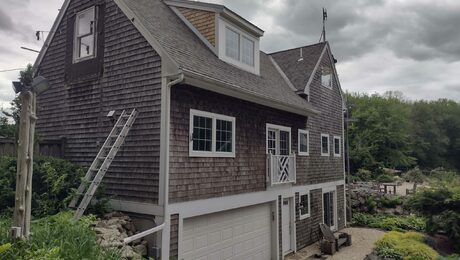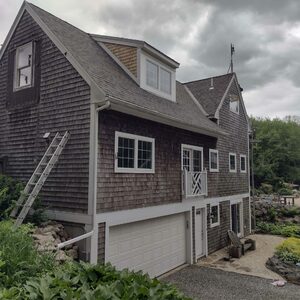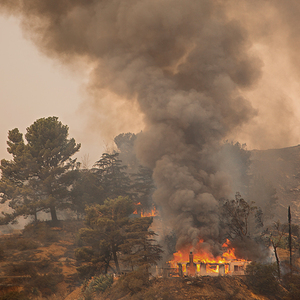I know…it’s another water heater question. I promise, I’ve searched and searched and I can’t answer my question through the archives.
Anyway, a little about me. I’m an advanced DIY’er and have rebuilt or upgraded 75% of my current home.
My question is centered around efficiency and water heater size. I’m changing out our old 40 gallon/gas water heater and am not sure if 50 gallon will be enough…but I’m also not sure if the 75/80 gallon will negate the efficiency of newer units. I’ve done the math regarding usage and we’re on the bubble leaning towards not having enough. I’m looking for some real world experience as opposed to my calculator.
We have two young boys who will grow through teenage-hood during the life of this unit. DW does a ton of laundry (as can be expected) and dishwasher is a daily use (mostly in the middle of the night). Showers and maybe laundry may be in concurrent use and everyone but me seems to spend all day in there.
I’m pretty sure the cost of a tankless and the capacity wouldn’t be practical. I’m in NJ so the winter incoming water increase maybe 65-80 degrees…that’s a lot cash and a lot of BTU’s at 4-5 gallons/min.
So the question: Would going to 75/80 gallons be a practical decision or would the loss associated with standby heating and the cost of the unit out pace the energy usage of the smaller unit? Or am I destined to take cold showers?



















Replies
In theory, as a tank gets larger the standby losses PER GALLON go down. Of course, the absolute standby losses go up. Non-standby energy usage (energy used to actually heat water) would remain about the same (per gallon used) so long as the heaters being compared are of substantially equal quality and technology.
There is probably still a sticker on the existing unit that gives it's cost to operate and some other stats. If it doesn't give an efficiency number you can work backwards from the cost to operate and the gas price stated on the sticker to figure the gas usage. Compare that to the numbers for the new heater to get a rough guess at the relative energy used.
Keep in mind that many people report usage increasing when a small heater is replaced with a larger one or a tankless, since people tend to take longer showers. That's highly dependent on your family and their habits, though.
Our current primary residence is in central NC....not nearly as cold as you experience in NJ on a regular basis....however we recently had a late nighter and outside temps were 17 degrees.....after the extended long day and cool evening I grabbed the missus, lit the candles, turned on the full flow faucets to the whirlpool, jumped in the shower to wash the dust and grime so as not to drag it into the tub.....oh dual head shower at that....although they are low flow units.
We experienced a minimal drop in pressure with all this running....finished the shower which is virtually perfect timing to fill the tub and climbed in to a refreshingly hot soak.
I love my single large 195k btu tankless water heater.
I would think that your worst case with one of these units would be a single shower at the time during the absolutely longest coldest winter. During our typical 30 degree nights we can run two showers and the dishwasher simultaneously with the only change being a minimal drop in water pressure......maybe 40 psi rather than the 50 we get out of a single shower.
In reading your post it doesn't appear that you overlap your hotwater useage but even if you did, you'd simply see a little less pressure primarily during the winter.
Mine is an externally mounted unit but I would recommend an interior unit in your location.
Pedro - A squeaky clean stubborn Mule
Thanks for the info. My concerns were that our current set up has the DW just about out of hot water when she's out of her marathon shower. Boys are currently in the bath/shower stage and will come close. We need a window of time between to insure that everyone but me get a full dose. Obviously our current water heater is old and not running at full tilt, but I'm thinking that 40 is low on our scale. have you figured your per gallon cost as it relates to the tankless? 195K Btu uses a lot of energy, but I would imagine that the lack of standby loss would negate the increase in usage. My other concern with tankless is the maintenance costs over the life of the unit. I'm wondering if I'm being overly particular about efficiency and energy usage. It seems based on my research that the differences over the life of standard tank units at any size seem to be negligible. I would imagine that it would be more of an impact if I weren't needing the capacity of a bigger unit....my wife's eyes would be glossing over if I were having this conversation with her.
Generally you do not see a cost reduction with tankless. Costs only go down in situations where there is substantial standby loss (relative to water use), as a weekend cabin.
God is REAL, unless explicitly declared INTEGER
You might want to look at the table here:http://www.aceee.org/consumerguide/waterheating.htm
God is REAL, unless explicitly declared INTEGER
That link was very similar to what I've seen. It's very helpful...thanks.I'm concluding that considering my 40 gallon unit is near 15 years old it's actually costing me more to run than if I had a new 75/80 gallon. The EF rates I'm finding for these older units are horrible. I appreciate the real world advice as well. My guess is that on average 2 showers will be running within an hour, plus ancillary fixtures. Nobody but me seems to use any cold water. That alone should have me upgrade. Everything seems to point to the larger tank...unless someone can talk me out of spending more money....please?
"195K Btu uses a lot of energy, but I would imagine that the lack of standby loss would negate the increase in usage."Actually that 195K Btu/HOUR and it is not a measure of energy, but rather power, or the rate at which energy is transfered.It takes X amount of energy (BTU's) to heat a gallon of water. It is the same amount of energy to heat that water if you use a candle for 2 hours or a blow torch for 20 seconds.There are two main difference in the energy used by a tankless vs tank.The tankless does not have standby losses which means less gas usage. But the numbers quoted is often higher tha real life.The tankless does does not limit the total amount of hot water so that some people take longer showers which will use more energy..
William the Geezer, the sequel to Billy the Kid - Shoe
I would run a 40 gallon water heater and get good low flow showerheads. My wife and teenage son can take 20-30 minute showers at the same time with no loss of hot water, I then take a 5-`10 minute shower and still have hot water.
We only have trouble when you add in the washer on HOT.
We might have bigger problems than a hot water heater if that's the case. Hot water is a premium in our house with a 40 gallon tank. I'm sure there are many variables including temp, water usage and flow rates. We also have abandoned the low flow heads for circus animal grade.How old is your water heater? Is there a noticable difference in a 15 year old tank as it compares to say a 5 year? Maybe it's just an age thing?
RE:
"We might have bigger problems than a hot water heater if that's the case. Hot water is a premium in our house with a 40 gallon tank.
I'm sure there are many variables including temp, water usage and flow rates. We also have abandoned the low flow heads for circus animal grade.
How old is your water heater? Is there a noticable difference in a 15 year old tank as it compares to say a 5 year? Maybe it's just an age thing?"
my heater is an 8 year old powered vent propane model with electronic ignition. It gets flushed once a year and has softened water. I really think the shower heads are the real savers.
Operating costs vary depending on useage.
For steady users the cost should be relatively equal.
My unit is propane and I bought a 320 gal. tank. We cook and occasionally run gas logs in the GR. plus water heating. I fill it once per year at the best rate available thus controlling my general costs. I can actually go about 19 months with a wife and teenage daughter.
I flush the drain line a couple of quick bursts a year and keep a quality battery backup/UPS connected to the electronics. Otherwise I'm not really aware of any specific maintenance issues. Estimated feedback is an average of 25 yr. lifespan and estimated at 30 years with the minimal maintenance recommended...as I do.
Twice the purchase price, twice the life, same operating costs for a fulltime family.
Why do I like it?....I have "Never" ran out of hot water. As I reach retirement and spend more time at the retirement cabin I gain extra savings by not "keeping" water hot.
Concerned about kids taking too long?......Lovingly stated: Be a Parent not a Friend
As my childs parent I am responsible for teaching her reasonable conservation which includes showers meant to clean a body not to fill a pool. Our daughter is allowed 300 minutes of low flow shower per month. Thats two - five minute showers per day or one - twenty minute every other day.....use it how you want.
She's great about keeping up with the time....she knows I'm cantankerous enough to hit the power switch on the demand unit if I think she's over her limit.
Pedro head pack mule
Or install one of these:
http://www.kingssupply.com/item133.htm
God is REAL, unless explicitly declared INTEGER
................Or install one of these:http://www.kingssupply.com/item133.htm
I'll try that if she wants to live at home after college.....could also adapt it to the fridge and bedroom door.......
Pedro Pappa Mule
Ah! Teenagers will be involved.
In that case, get the smaller unit, but don't plumb hot water to the kids' shower. They'll take really short showers, saving you tons of money.
Otherwise, go with the bigger unit.
They'll still use up all the hot water though.
DAMHIKT.
;-)
Mike Hennessy
Pittsburgh, PA
PS: When my kids hit the teen years, I was forced to adjust the temp limit on the shower valve so the shower never got much above "warmish". Good enough for me and My Lovely Assistant, and it kept the lengths of the kids' showers to something more closely approaching reasonable.
If you're concerned about tankless not having enough hot water output (I'm not a big fan of tankless water heaters either and I live in NJ), why don't you consider the Vertex line of hot water heaters by A.O. Smith?
Edited 1/13/2009 1:09 pm ET by ejazz2095
As I pointed out to some else just last week if money in no object look at this bad dog. $1700 but if you compare that to a tankless needing a stainless vent kit and increased gas piping 3/4 on most it is in the same price range.
According to there web site the best of both worlds tankless and tanked with 96% THERMAL EFFICIENCY
http://www.hotwater.com/products/residential/rg-vertex100.html
http://www.hotwater.com/lit/spec/res_gas/AOSRG45101.pdf
Wally o
Edited 1/13/2009 1:52 pm by wallyo
"According to there web site the best of both worlds tankless and tanked with 996% THERMAL EFFICIENCY"I want one of them.With that efficiency I could heat my whole house for a year on $50..
William the Geezer, the sequel to Billy the Kid - Shoe
Bill how big is your house? LOLWallyo
You caught my typo before i did. Jokes on me. Do you still want one?Wallyo
Edited 1/13/2009 1:54 pm by wallyo
I like the concept, but way too big for my needs..
William the Geezer, the sequel to Billy the Kid - Shoe
I know others have mentioned tankless already, but I want to offer some comments on them anyway. I just installed the biggest residential unit from Rinaii (I forgot how many btu's now) and am very pleased with it's perfromance. This unit keeps up with two showers going full bore- continuously!. Now, if a third shower was started (somewhat unlikely even with two kids and 3.5 baths) the unit would keep up with the tempurature of water supplied, but the volume would decrease some. This would be true for tank or tankless- you only have so much pressure and gpm available to your house from the city.
My situation is a little different than yours since I'm in Souther California and the incoming water in the winter months is probably much warmer than yours.
I don't know if this answer is relevant but I have a small apartment building in Boston. I use two hot water heaters. A 50 gallon for the summer and a 75 gallon for the winter when the input water temperature is colder and the 50 gallon just isn't quite enough. This also has the advantage that when a heater dies I just need to switch to the other heater.